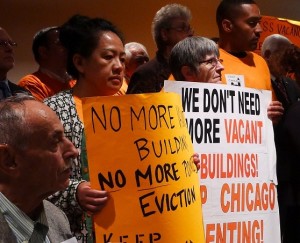By Chip Mitchell

Tenant advocates cheered Tuesday as new Chicago protections for renters in foreclosed buildings took effect. Their challenge now, they say, is spreading the word about the ordinance.
“The banks will be fighting it,” said Diane Limas of the Albany Park Neighborhood Council, a group that worked for years to pass the measure. “They will try to figure out every way to throw families out in the streets. But the best way to fight back against the banks is to make sure every renter knows their rights.”
The ordinance, known as Keep Chicago Renting, won City Council approval in June. It requires the foreclosing entity to provide a building’s tenants with a rent-controlled lease until selling the property — or pay them a “relocation assistance” fee of $10,600 per unit. The goal is to keep renters in their homes and keep the buildings from standing vacant and attracting vandals, squatters and thieves.
Last year there were 4,346 foreclosures on Chicago apartment buildings encompassing 11,932 units, according to the Lawyers’ Committee for Better Housing, which pushed for the ordinance. The committee says half of those foreclosures were filed by five companies: JPMorgan Chase, Bank of America, Wells Fargo, U.S. Bank and Deutsche Bank. Banks filed about 11 percent of Chicago evictions in the last half of 2012, the committee adds.
Groups representing bankers, realtors and landlords say the ordinance will backfire. “It’s going to be a disincentive for investment in multi-units from a wide range of financing sources,” said Brian Bernardoni, senior director of government affairs and public policy of the Illinois Association of Realtors. “Any time you have a lack of investment, there’s going to be a lack of rehab, a lack of sustainable affordable housing and preservation of affordable housing units.”
Tenant advocates point out that the measure applies only to the first owner after the foreclosure auction. From there, any party that buys the building is free to evict the tenants without the relocation fee.
As aldermen and Mayor Rahm Emanuel’s administration worked on the measure this spring, the Illinois Mortgage Bankers Association warned that the rent cap would violate the Illinois constitution. Questioned Tuesday, neither the mortgage bankers group nor the Illinois Bankers Association answered whether they were planning a court challenge.
